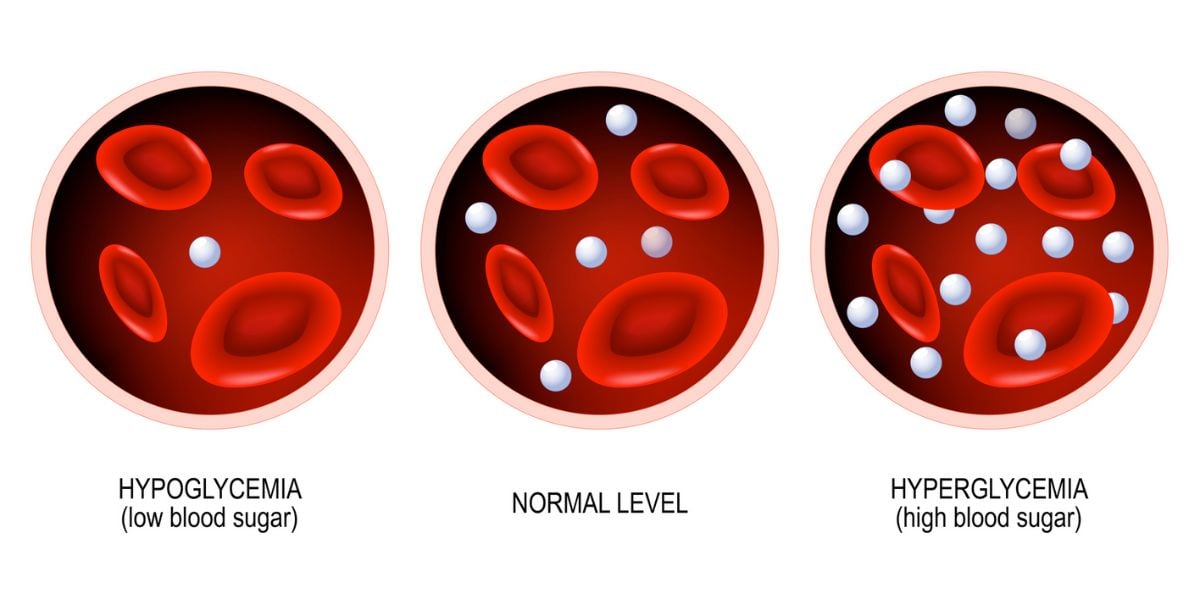Carbohydrates are sugars that come in 2 main forms – simple and complex. This is also referred to as simple sugars and starches.
The difference between a simple and complex carb is in how quickly it is digested and absorbed – as well as it’s chemical structure.
Most carbohydrates can be broken down by digestion into glucose and these are the carbohydrates we shall look at in this article.
For examples of carbohydrates that do not get fully broken down into glucose, see insoluble fibre and sugar alcohols
Simple carbohydrates
Simple carbohydrates are called simple sugars. Sugars are found in a variety of natural food sources including fruit, vegetables and milk, and give food a sweet taste. But they also raise blood glucose levels quickly
Sugars can be categorised as single sugars (monosaccharides), which include glucose, fructose and galactose, or double sugars (disaccharides), which include sucrose (table sugar), lactose and maltose.
Many processed foods contain added sugars but currently there is no UK law that requires manufacturers to state how much sugar has been added in processing
The NHS advises adults to consume less than 70g a day of sugar for men and under 50g of sugar a day for women However, people with diabetes will benefit from better blood glucose levels if sugar intake can be limited to lower levels.
Because sugars provide no nutrition aside from energy (hence why they are often referred to as empty calories), people looking to lose weight will also benefit from eliminating sources of added sugar from their diet.
Note that if you are at risk of hypoglycemia, never worry about taking sugar if it is to avoid or treat a hypo
Complex carbohydrates
Complex carbohydrates, also known as polysaccharides, are starches formed by longer saccharide chains, which means they take longer to break down.
Chemically, they usually comprise of three or more linked sugars.
Strictly speaking, the term complex carbohydrate refers to any starches, including the highly refined starches found in:
- White bread
- Cakes
- Most pastries and
- Many other food sources
When dietitians and nutritionists advise having complex carbohydrates, however, they are usually referring to whole grain foods and starchy vegetables which are more slowly absorbed than refined carbohydrate.
Whole grain foods
Whole grain starches include the wheat grain and kernel which provide the majority of fibre and nutrients to be found in starchy foods.
When it comes to picking starchy foods, such as rice, bread and any other products made from flour, it’s best to opt for whole grain versions of these products.
Whilst whole grain foods impact upon blood glucose levels more slowly than other forms of carbohydrate, higher levels of carbohydrate can still raise blood sugar levels substantially.
Blood glucose testing before and meals is a good way to assess how much carbohydrate your body can adequately cope with.
Refined carbohydrates
Refined carbohydrates refer to carbohydrates that have been processed.
In grain products, the bran and kernel are stripped out, leaving just the starch. With much of the fibre removed in this way, the carbohydrate is broken down by the body more quickly and can sometimes raise blood glucose levels as quickly as simple sugars.
Simple sugars can also be refined. A prominent example of a processed sugar is glucose-fructose syrup, also known as high fructose corn syrup. Glucose-fructose syrup is corn syrup which has been treated with enzymes to turn a proportion of the syrup’s glucose into fructose.




